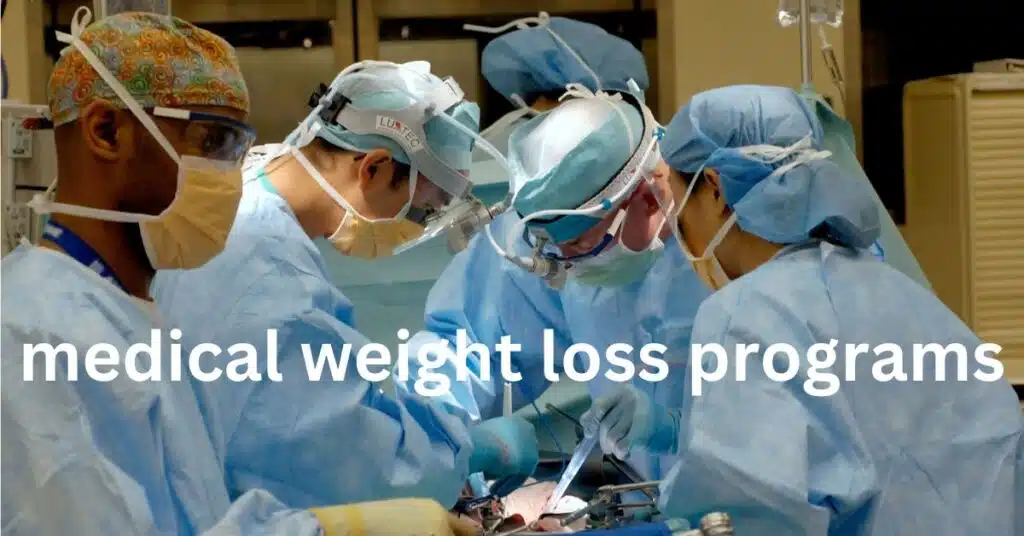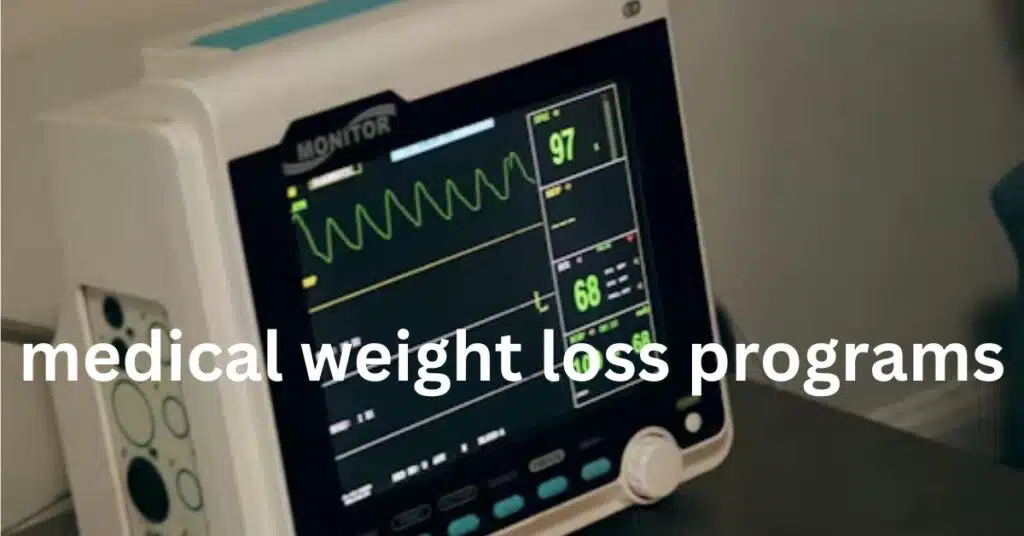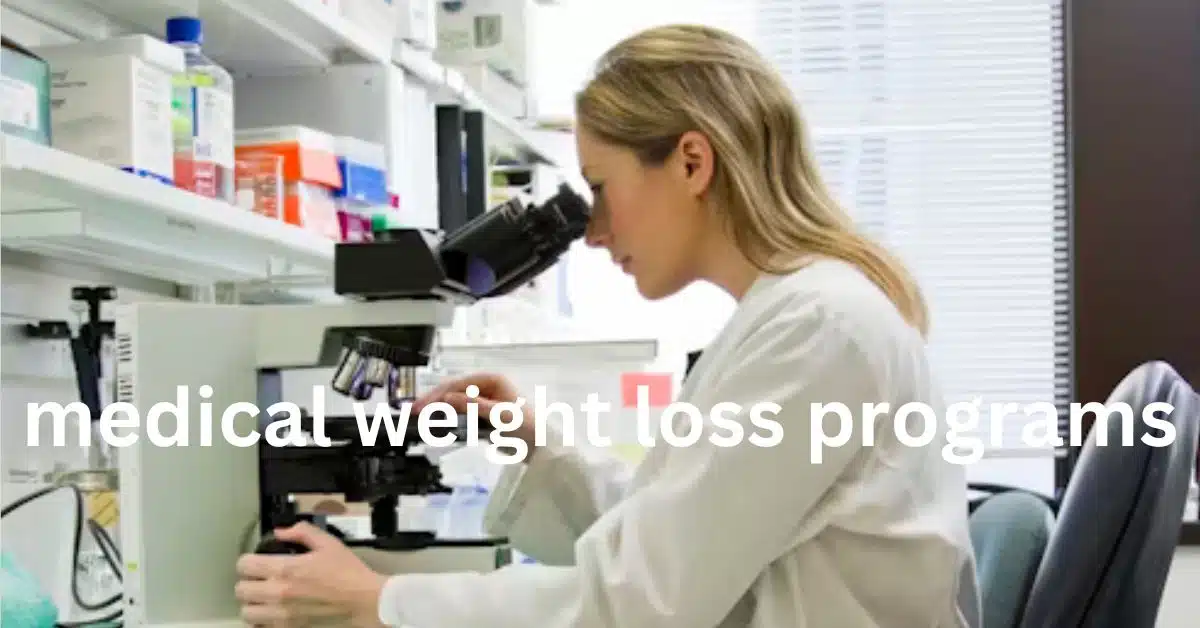medical weight loss programs
We are all searching for this magic formula: how to lose weight effectively without a detour from health. Many are considering a potpourri of weight loss supplements and plans that one undergoes in a medical setting. This powerful pairing might be the ticket to achieving enduring, science-based weight-loss results. What truly works? Let’s explore the science behind weight loss supplements and how they could complement medical weight loss plans for help on the way to success.
What Are Medical Weight Loss Programs?
First of all, what are medical weight loss programs? They are typically tailored and supervised plans led by doctors or nutritionists. Medical weight loss programs differ from fad diets as they focus on tailored strategies—personalized changes in diet, exercise routines, or sometimes FDA-approved medicines—that ensure safe results.

Well, one key advantage of these programs is that they are science-based, targeting the root cause of weight gain—the hormonal, metabolic, or lifestyle-related imbalance. medical weight loss programs
Role of Supplements in Weight Loss
Weight loss supplements promise great results but depend on how and what’s being placed in the bottle. The most commonly used types of supplements have three categories:
Appetite Suppressants
These supplements work by suppressing hunger through regulation of hormones like ghrelin, the “hunger hormone.” Glucomannan, a natural fiber, and 5-HTP—a precursor to serotonin—are commonly administered in medical settings for curbing cravings.
Fat Burners
Supplements that increase metabolism or aid your body in breaking down fat more effectively are in this category. Ingredients like green tea extract, caffeine, and capsaicin from chili peppers will have a recognized fat-burning capacity.
Nutrient Replacements
Supplements such as protein powders, vitamins, and meal replacements may be used to fill nutritional gaps. For example, high-protein shake consumption allows individuals to lose fat without losing lean body muscle; therefore, it is a best seller in medical weight loss programs.
Science in combination: Supplements with Medical Weight Loss Programs
Being combined with proper medical support can boost weight loss supplements dramatically. Why? Because you’re not only about supplements; it’s about how they fit into your overall plan.medical weight loss programs
medical weight loss programs
Consider Sarah’s case as a way of illustrating: Sarah was a 35-year-old working mother who had emotional eating and a sedentary lifestyle. She found her way into a medial weight loss program where the doctor prescribed her prescription appetite suppressants along with protein shakes. She therefore lost 20 pounds in three months without crash dieting, thanks to her regular checkup with her physician.
And here’s the magic: medical programs ensure that the supplements you take are effective, safe, and tailored for your unique needs.
What Works—and What to Watch Out For
medical weight loss programs
- Evidence-Based Ingredients
- medical weight loss program
Buy supplements containing clinically tested ingredients. A case in point is glucomannan, which, according to research, can help with weight loss if accompanied by a low-calorie diet. Caffeine, as you might know, has been tested to raise calorie burn during exercise. - Steer Clear of Gimmicky Claims
Supplements that promise dramatic weight loss in days are often too good to be true. Stick to science-backed products and consult with your medical team before starting anything new. - Timing Matters
Some supplements are most effective when taken at specific times. For example, taking protein shakes post-workout helps with muscle repair, while appetite suppressants work best before meals.
Practical Tips for Success
If you want to take weight loss supplements with a medical weight loss program, the following are some doable pieces of advice:
Get a Professional
You must see a healthcare professional who can guide you on what supplements are safe and effective for your particular health needs.
Track Your Progress
Use a journal or an app to monitor how your supplements are influencing your appetite, energy, and weight loss. This feedback helps fine-tune your medical team’s plan for you.

Long-term Outcomes
There are no magic pills, of course. It’s the tool—supplements combined with healthy habits such as regular exercise, balanced nutrition, and proper sleep to achieve lasting weight loss.
medical weight loss programs
The Bottom Line
The science shows promising weight loss for supplements given with a program of medical weight loss. Such programs do provide the much-needed structure, safety, and individualization for most people to be successful; supplements add an extra push to your efforts.
The take-away? Don’t do it yourself. Used responsibly and with professional guidance, the best combined programs of medical weight loss and evidence-based supplements will result in some pretty amazing, long-term effects.
People use medical weight loss programs as part of their journey toward a healthy weight, and that is precisely because of their structured, science-backed approach. But with these programs in place, an accompanying set of supplements based on weight loss often finds its usage. But are they worthy? What says science about their involvement in medical weight loss? Let’s dissect the facts on weight loss supplements and how they enhance efforts in a monitored medical plan.
Understanding Medical Weight Loss Programs
A medical weight loss program is a professionally designed, supervised plan to reach healthy weight for life. Not a diet nor a commercial weight loss plan, these programs will take into account medical conditions, metabolic needs, and personal goals. They may include:
Personalized meal plans
Exercise programs
If necessary, FDA-approved medications
Lifestyle counseling
The main difference in the program is expert supervision, ensuring safety and long-term success.
How Weight Loss Supplements Fit Into Medical Weight Loss
Weight loss supplements are sometimes looked at as a shortcut, but in the use of medical weight loss, they are used to strategically fit into a program and help people with certain problems, such as:
Reducing hunger
Increasing basal metabolic rate
Filling nutritional deficiencies
With emphasis on evidence-based supplements, the medical professional ensures that the products utilized are effective and to the body’s needs.
Types of Weight Loss Supplements
Let’s take a closer look at the types of supplements that are most often used and how the science behind them makes them work:
Appetite Suppressants
How They Work: Block appetite by affecting hormonal agents that regulate hunger.
Key Ingredients:
Glucomannan: A natural fiber that expands in your stomach, making you feel fuller.
5-HTP: Increases levels of serotonin, a neurotransmitter that helps alleviate emotional eating.
Science Says: Glucomannan has been proven to support weight loss when used as part of a calorie-restricted diet.
Thermogenic Fat Burners
How They Work: Boost calorie expenditure through heightened metabolic activity.
Key Ingredients:
Green Tea Extract: It is a rich source of catechins, which enhance the burning of fat.
Caffeine: This stimulates energy expenditure along with workout performance.
Capsaicin: Obtained from chili peppers, it creates body heat to burn fat.
Science Says: A 2019 study established that green tea extract may add to a small increase in fat oxidation during physical activity.
How They Work: Provide necessary nutrients while lowering the total calorie intake.
Key Choices:
High-protein shakes: Aiding in maintaining muscle mass during loss
Multivitamins: Fill deficiencies that may slow down improvement
Science Says: A 2020 meta-analysis concluded that high-protein diets enhance satiety and prevent muscle wasting during weight reduction.
Real-Life Example: Using Supplements along with Medical Weight Loss
Consider Lisa. At 42, she was beset by a slow metabolism and cravings she couldn’t control. She went to see a physician who prescribed her FDA-approved appetite suppressants along with a high-protein diet, backed up by meal replacement shakes.
The outcome? Lisa lost 30 pounds in six months and felt good about it. She had energy and a toned, taut body. Her medical team adjusted her supplements as necessary so she never developed a side effect.
Role of Medical Supervision
An essential aspect of supplement use during medical weight loss is proper supervision. Supplements available over the counter are tempting, but not all are safe or effective. A medical professional will ensure that:
medical weight loss programs
The supplements do not interact with medications.
Doses are appropriate for your age, weight, and health conditions.
Results are monitored to adjust the plan as needed.
What to Watch For in Weight Loss Supplements
medical weight loss programs
- Evidence-Based Ingredients
Seek supplements with clinical backing. If an ingredient claims to work “overnight,” it’s likely a red flag. - Side Effects
Even natural ingredients can cause side effects. High doses of caffeine may cause insomnia or jitters. - FDA Approval
Some supplements, especially those in medical weight loss programs, undergo rigorous FDA evaluation to ensure safety and efficacy.
Practical Tips for Using Supplements Effectively
Start with a Medical Consultation
Your healthcare provider will recommend supplements that align with your program goals.
Don’t Rely Solely on Supplements
They should complement—not replace—healthy eating and exercise habits.
medical weight loss programs
Track Your Progresfatlossinsight.coms
Use the weight loss journal or app to monitor the impact of supplements on your energy, appetite, and weight loss over time.
medical weight loss programs
